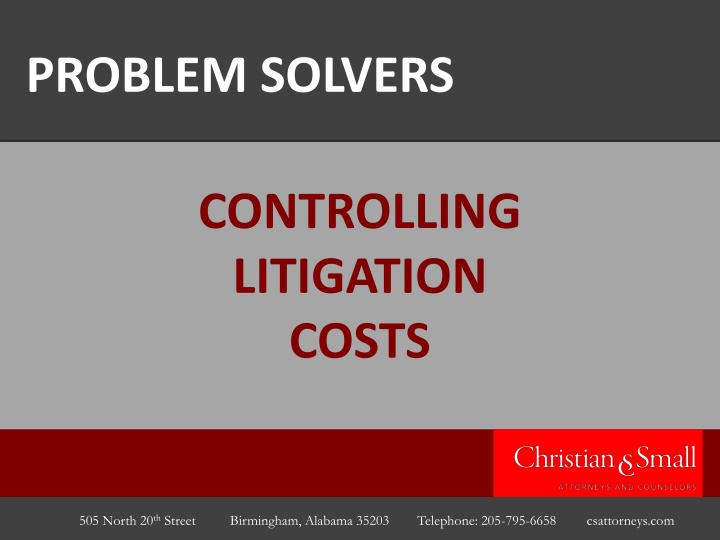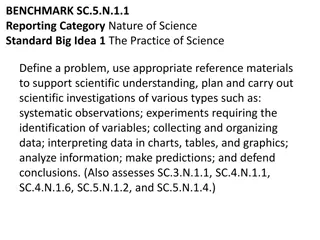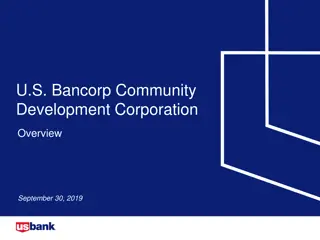Evaluating Fifth Third Bancorp v. Dudenhoeffer: One Year Later
This presentation provides insights on the aftermath of the Fifth Third Bancorp v. Dudenhoeffer case, discussing types of claims in publicly traded employer stock litigation, categories of litigation cases, and the evolution of legal presumptions. Explore key legal developments impacting employer stock funds.
Download Presentation

Please find below an Image/Link to download the presentation.
The content on the website is provided AS IS for your information and personal use only. It may not be sold, licensed, or shared on other websites without obtaining consent from the author.If you encounter any issues during the download, it is possible that the publisher has removed the file from their server.
You are allowed to download the files provided on this website for personal or commercial use, subject to the condition that they are used lawfully. All files are the property of their respective owners.
The content on the website is provided AS IS for your information and personal use only. It may not be sold, licensed, or shared on other websites without obtaining consent from the author.
E N D
Presentation Transcript
PROBLEM SOLVERS CONTROLLING LITIGATION COSTS 505 North 20th Street Birmingham, Alabama 35203 Telephone: 205-795-6658 csattorneys.com
HISTORY OF BILLING FOR LEGAL SERVICES Billing process before timekeeping Flat fee Estimate of fairness
HISTORY OF BILLING FOR LEGAL SERVICES Advent of Timekeeping Captured items not previously billed More time required on more complex cases One inch file v. file occupying a room
HISTORY OF BILLING FOR LEGAL SERVICES Increase in law firm overhead Advent of technology and associated cost Associate and legal staff salaries Health insurance
PROBLEM SOLVERS: CONTROLLING LITIGATION COSTS LEGAL FEES ARE A PRODUCT OF TIME AND RATES
LEGAL FEES ARE A PRODUCT OF TIME AND RATES Reduce time spent on case Early case disposal Claims personnel make contact with attorney to request assistance in evaluating case for settlement before lawsuit is filed. Jurisdiction where suit will be filed Judges Jury pool Case backlog Plaintiff s attorney s ability and connections in jurisdiction Need to associate local counsel
LEGAL FEES ARE A PRODUCT OF TIME AND RATES If claim adjuster cannot settle, engage attorney to: Negotiate with plaintiff s attorney Schedule pre-suit mediation Use of retainer letters to reduce time case is in litigation State hourly rate to be paid for legal services of partners, associates and paralegals Require efforts to reach early settlement Require procurement of all necessary information to evaluate case within specified period of time - deadline Agree only to pay normal and reasonable expenses Agree to frequency of billing
LEGAL FEES ARE A PRODUCT OF TIME AND RATES Ways to reduce rates Fixed fee arrangements What is purpose - reduce fees and expenses What cases do they work in Cases where cost is predictable Problems How much risk can a lawyer afford to take Who is managing work performed on case lawyer or client? Is client willing to relinquish decision making regarding defense to lawyer?
LEGAL FEES ARE A PRODUCT OF TIME AND RATES Renegotiation of fee as case develops By client - case settles in a week By lawyer - case lasts forever, unanticipated work Will not work without mutual trust
LEGAL FEES ARE A PRODUCT OF TIME AND RATES Alternative fee arrangements Bonus v. Penalty based on date of disposition - the longer a case is pending the higher the attorney s fee Establish procedure to pay bonus based on percentage of attorney s fee billed at time of settlement if case settled within designated time period (12-18 months) Reduce hourly rate if case not settled or tried at first trial setting
LEGAL FEES ARE A PRODUCT OF TIME AND RATES Contingent fee arrangement Establish settlement value of case Deduct amount of settlement or verdict there from Allow percentage bonus based on savings Problems - Agreement on settlement value - client (low) v. lawyer (high) (creates distrust at each stage of case) Percent of bonus Verdict or settlement in excess of agreed settlement value What is the incentive to the client - since the client only benefits if there is a good result
LITIGATION GUIDELINES Purpose - Encourage and promote early settlement and reduce attorney s fees and expenses
WHAT CLIENT SHOULD DO Be selective in attorney you hire Know they are trustworthy Ask for their help in controlling costs Know in advance what their rates are Give all of your work to one law firm in any jurisdiction makes you more important to law firm as a client Discuss the billing practices with your attorney Call attorney over any problem on the bill and ask for explanation
WHAT LAWYERS SHOULD DO Provide settlement evaluations as required by litigation guidelines and update evaluations as the case progresses. Explain in detail the reasons for changes in your evaluation and provide exhibits, video depositions, or anything else that supports your changed evaluation.
WHAT LAWYERS SHOULD DO Do everything you can do to resolve the case at the earliest possible time, as is appropriate and in the best interest of your client. This will save both you and the client valuable time and resources. Make sure your client knows that you are working to handle the case efficiently and effectively.
WHAT LAWYERS SHOULD DO Be honest with your billing. Describe the work you do on your time sheet so the client understands what: what you did why you did it how the client benefited from the work Bear in mind that some items may not warrant a charge and should be designated as no charge.
WHAT LAWYERS SHOULD DO Diplomatically and tactfully make suggestions about better practices your client could employ.
WHAT LAWYERS SHOULD DO Let your clients know they are important to you and your firm.
PROBLEM SOLVERS 505 North 20th Street Birmingham, Alabama 35203 Telephone: 205-795-6658 csattorneys.com























